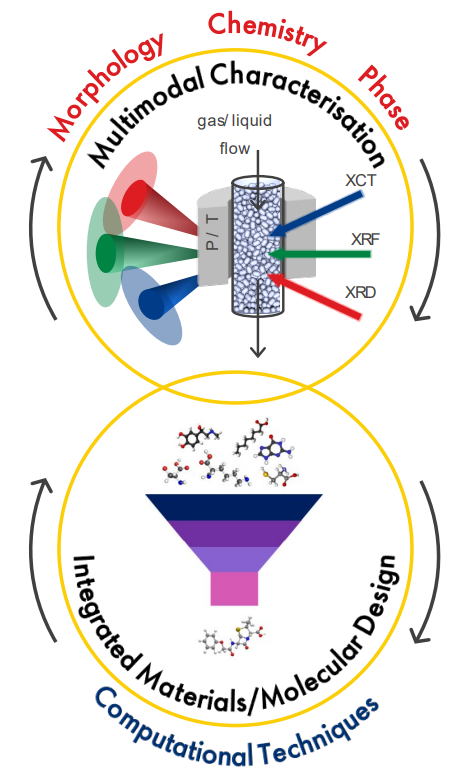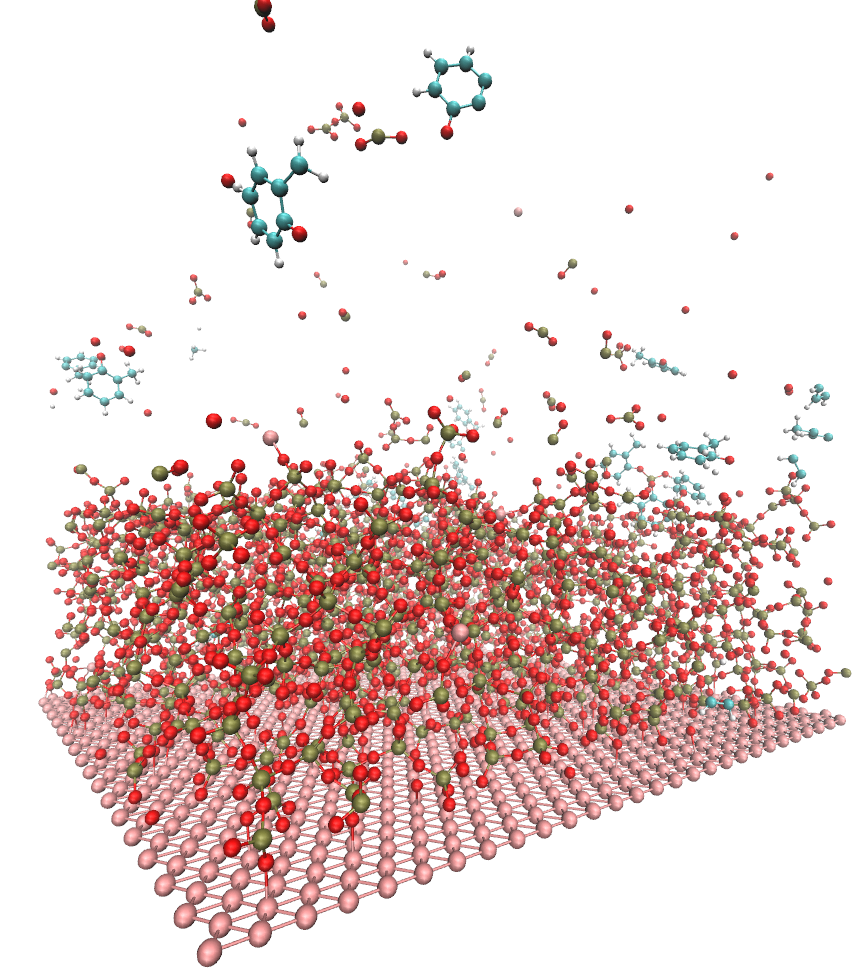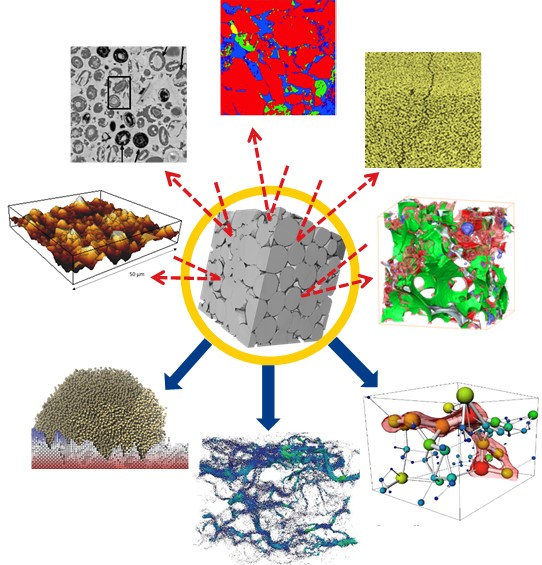Developing New Scientific Methods

To tackle the most pressing issues facing society, we need experiments that can give us data representative of dynamic systems in extremeconditions. The InFUSE partnership aims to design experimental cells and workflows that will allow correlative operando studies, across multiple beamlines as well as College laboratories. This will provide a holistic, more detailed understanding of the systems of interest. Too often, different experimental approaches such an imaging or spectroscopy are carried out in isolation, with no straightforward way to combine data from different experimental techniques. By breaking down these barriers, we can develop our understanding of materials interfaces further, and identify routes for optimisation of critical technologies.
Multiscale Modelling
The combination of experimental studies with high-level computational simulations can provide otherwise unobtainable insight into the dynamic evolution of interfaces. The obstacle to meaningful correlation between these approaches is often the significant gulf between the time and length scales that computational techniques can reach and those accessible to experimental systems. In some cases, this difference is several orders of magnitude! To overcome this obstacle, entirely new approaches are required. The InFUSE team is developing novel computational approaches to investigate the synergetic effects of different atomic scale processes (adsorption, desorption, diffusion, reactions etc.) on the formation and growth of nanoscale films. Combined with cutting edge operando capabilities at Diamond Light Source, the aim is to obtain correlative data from both theory and experiment.
Application Areas
The transition from fossil fuel powered cars towards fully electric vehicles presents new material challenges for engine components and, in some cases, requires the development of an entirely new class of cooling fluids and lubricants (e-fluids). This necessitates a step change in the way we study the formation of these tribofilms, with early-stage growth, under extreme stress and over short time periods, key to the formation of these films. Tribological problems are multi-disciplinary, with mechano-chemical interactions, material evolution and physical mechanisms strongly intertwined; interactions at the smallest scales dictate the macroscopic interfacial behaviour and are affected by the macroscopic configuration being investigated. As well as studying thin-film growth and evolution, InFUSE aims to study the role of temperature, stress and chemistry on surface thermal gradients. This overlaps heavily with the study of immersive cooling technologies for battery powered vehicles and materials integrity studies.
transition from fossil fuel powered cars towards fully electric vehicles presents new material challenges for engine components and, in some cases, requires the development of an entirely new class of cooling fluids and lubricants (e-fluids). This necessitates a step change in the way we study the formation of these tribofilms, with early-stage growth, under extreme stress and over short time periods, key to the formation of these films. Tribological problems are multi-disciplinary, with mechano-chemical interactions, material evolution and physical mechanisms strongly intertwined; interactions at the smallest scales dictate the macroscopic interfacial behaviour and are affected by the macroscopic configuration being investigated. As well as studying thin-film growth and evolution, InFUSE aims to study the role of temperature, stress and chemistry on surface thermal gradients. This overlaps heavily with the study of immersive cooling technologies for battery powered vehicles and materials integrity studies.
Without large scale energy storage solutions our grid will not be able to accommodate a full shift to intermittent renewable sources. The InFUSE Prosperity Partnership is dedicated to developing sustainable and high-performance battery technologies such as sodium and aluminium ion chemistries. The performance of these systems, as well as that of new catalysts for fuel cells, is currently limited by the understanding of the complex interactions between mobile species and the electrode materials as well as degradation of electrodes. Improving the efficiency and lifetime of these novel technologies requires detailed multi-length-scale characterisation and modelling of complex and dynamic interfaces. Through the combinations of spectroscopy, microscopy, imaging and diffraction across multiple beamlines, InFUSE aims to tackle these challenges using a holistic approach under realistic conditions. This includes the development of novel operando cells for spectroscopy, the incorporation of cryogenic cooling into existing workflows and advanced modelling techniques to access longer time and larger length scales.
The r apid and safe deployment of carbon capture (utilisation) and storage CC(U)S is essential to meeting our climate targets. Central to these technologies is an understanding of two-phase flow in porous materials, and of the transport processes within their pores. For InFUSE, this includes studies of the functionality of microporous adsorbents in their operating environment (by probing the concentrations of chemical species in both the fluid and the solid), the formation of carbonate minerals within rock pores and their impact on reservoir quality, and wettability design for optimal flow performance within porous systems. Recent achievements in synchrotron-based experimentation at Diamond provide unprecedented opportunities for quasi-simultaneous acquisition of x-ray tomograms and diffraction patterns. Microscale studies within the same sample at the same location opens up new opportunities in the combined observation of phase and morphology during these processes.
apid and safe deployment of carbon capture (utilisation) and storage CC(U)S is essential to meeting our climate targets. Central to these technologies is an understanding of two-phase flow in porous materials, and of the transport processes within their pores. For InFUSE, this includes studies of the functionality of microporous adsorbents in their operating environment (by probing the concentrations of chemical species in both the fluid and the solid), the formation of carbonate minerals within rock pores and their impact on reservoir quality, and wettability design for optimal flow performance within porous systems. Recent achievements in synchrotron-based experimentation at Diamond provide unprecedented opportunities for quasi-simultaneous acquisition of x-ray tomograms and diffraction patterns. Microscale studies within the same sample at the same location opens up new opportunities in the combined observation of phase and morphology during these processes.
A Cleaner Energy Future
What does ‘net zero’ mean and how is Shell working to be net zero in both the UK, and across our global businesses? Find out more by visiting Shell's website.
A vision for sustainable zero pollution
Find out more about the Transition to Zero Pollution at Imperial.
